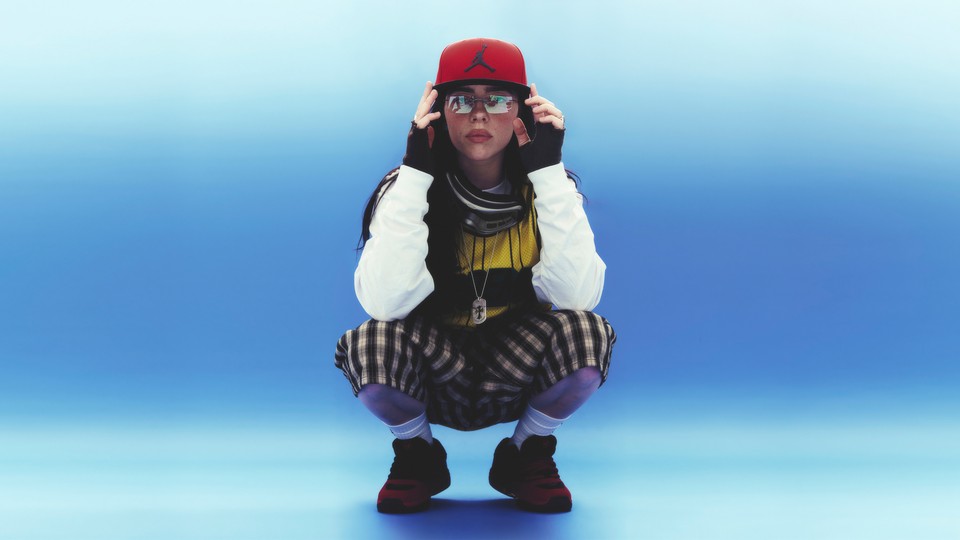The New Sound of Sexual Frustration
4 min read
In 1989, a socially anxious handyman named Trent Reznor shut himself in the Cleveland recording studio that employed him and emerged with one of rock and roll’s great statements of sexual frustration. Nine Inch Nails’s debut album, Pretty Hate Machine, blended noise with synthesized melodies and dance beats; it sounded like the work of a loner who hated his own need for connection, intimacy, and other bodies. In the ragged rasp of a man dying of thirst, Reznor screamed a confession: “I just want something I can never have!”
This history comes to mind as a precedent for Hit Me Hard and Soft, the sensational new Billie Eilish album. Ever since she was a young teen posting songs online, Eilish has spoken to the desires and anxieties of a headphone-encased, bedroom-secluded generation. Her brother, the producer Finneas, has helped her create an eclectic, depressive sound, merging folk and jazz with the goth-electronic lineage of Nine Inch Nails, New Order, and Portishead. Eilish’s third album boils this approach down to its slick essence, sustaining a mood of longing that is very now.
The core appeal of the album lies in its production. The ballads rustle and drift with feather-on-skin subtlety, and the uptempo tracks are appealingly minimalistic, enlivened by small, surprising choices. On “Lunch,” sprays of new-wave guitars enter slightly offbeat, for an ecstatic jump scare. On “Chihiro,” warning-siren keyboards push in at odd moments and then vanish. The astounding closer “Blue” plays like a walk into a dark woods: shuffling, countrified pop gives way to a disturbing piano interlude, and then witchy trip hop.
Amid all this musical tension, Eilish quavers and pants, turning every syllable into a satiny showpiece of texture. Her phrasings are inspired by cabaret greats such as Billie Holiday and Sarah Vaughan—though such comparisons do highlight Eilish’s unfortunate tendency toward simplistic, even childish, rhyme schemes. “Well, good things don’t last / And life moves so fast,” she sings in one of a few lines that feel like pure filler. Someday, with luck, she’ll attempt a bit more complexity in her songwriting—but then again, the stymied, stunted nature of her words do fit with what she’s singing about.
The 22-year-old Eilish recently went through a sexual awakening. “I’ve been in love with girls for my whole life,” she told Rolling Stone, but it wasn’t until last year that she realized, in anatomical terms, what exactly that desire meant. (I’m trying to paraphrase here.) Her experience seems to typify her carnally confused generation. Record numbers of young people are identifying as queer; traditional dictates around monogamy and abstinence need no longer hold as much sway; porn and dating apps offer a buffet of on-demand eroticism. Yet young people are, statistically, having less sex than their elders were at their age. Desiring and doing have never been so separate.
Largely muted but intermittently intense, Hit Me Hard and Soft captures this erotic dissonance. This is an album about wanting but not quite getting, or getting and then wanting something different, and mostly just soaking in isolation. Eilish sings of crushing on her buddy’s girlfriend, of waiting up late for a rendezvous that never happens, of realizing that the supposed love of her life was just some loser. “Chihiro” describes dating a veritable ghost; the notes move in the wrong direction from what the ear expects, and Eilish’s voice glitches in and out. Only the feisty single “Lunch” conveys the feeling of fantasy finally becoming reality—but even then, Eilish is coy, liminal: “I don’t want to break it / I just want it to bend,” she teases.
Part of Eilish’s angst arises from her trying to navigate porous boundaries of potential situationships: “Did I cross the line?” she asks a friend at one point. (Pair the album with the steamy tennis drama Challengers, soundtracked by Reznor and his co-collaborator, Atticus Ross.) Technology plays a role too. The album pulses with house, techno, and reggae beats, but Eilish, a child star born of the internet, has rarely been able to go out clubbing in real life. (The dance songs, she has said, were inspired by her need for hot songs in her earbuds at the gym.) On the carnivalesque “The Diner,” Eilish sings, “I saw you on the screens / I know we’re meant to be / You’re starrin’ in my dreams / In magazines.” She’s talking about her own stalker, but she could mean anyone with a parasocial fascination.
Eilish isn’t alone in her approach here. To a surprising degree, Hit Me Hard and Soft shares DNA with Taylor Swift’s The Tortured Poets Department, another recent album filled with claustrophobic synth pop about stymied lust. That album’s best moments (“Guilty as Sin,” “Fresh Out the Slammer”) are about pining for someone who’s not available—or about the almost-immediate, devastating comedown that can follow consummation (“Down Bad”). As in the way of so many modern lovers, Swift’s torment is worsened by “judgmental creeps” online, who monitor other people’s affairs and deem them cringe.
Eilish takes on such creeps as well, calling out the internet’s hunger for “the meanest kind of funny,” as she sings on “Skinny.” In the album’s very final coda, she asks, “But when can I hear the next one?” Coming after 44 minutes of sumptuous music, the line is clearly a joke about fans who make unending demands of their objects of worship. But it also gets at the core problem of modern desire. When fleeting pleasure is just a scroll away, lasting satisfaction can feel like something we’ll never get.



